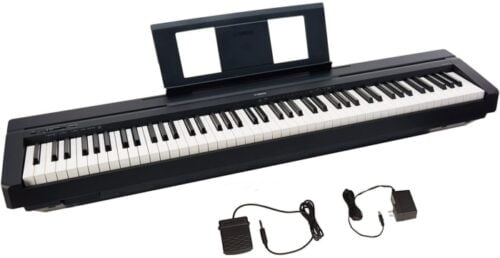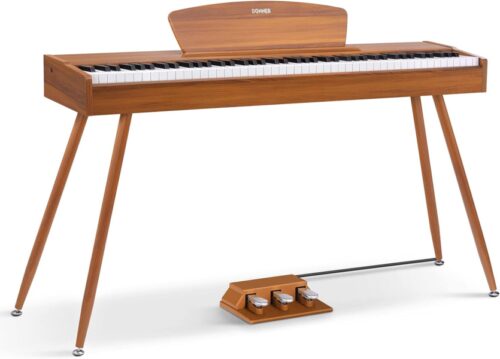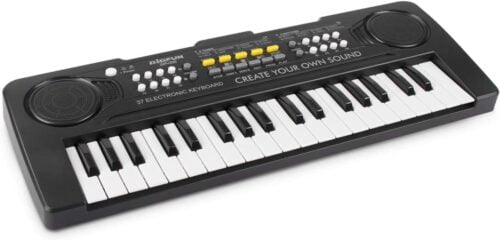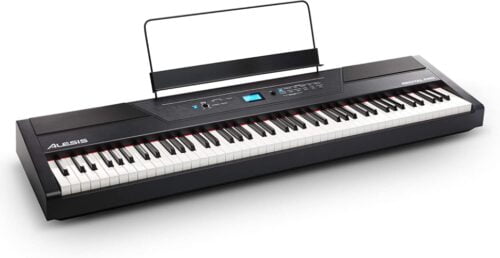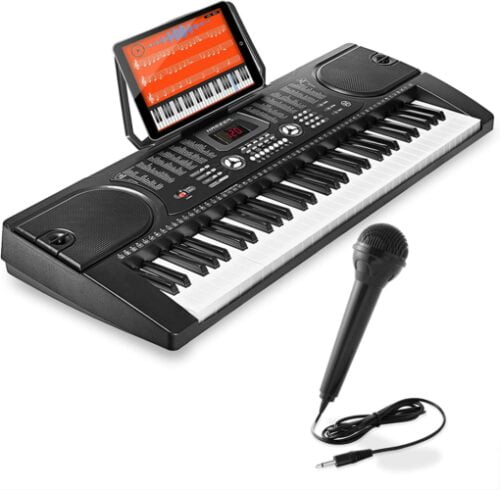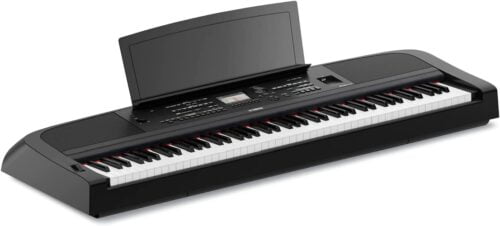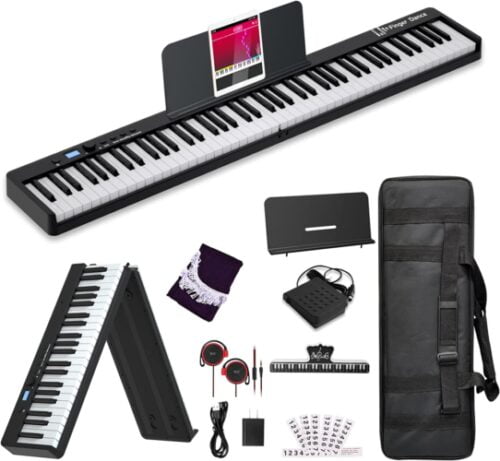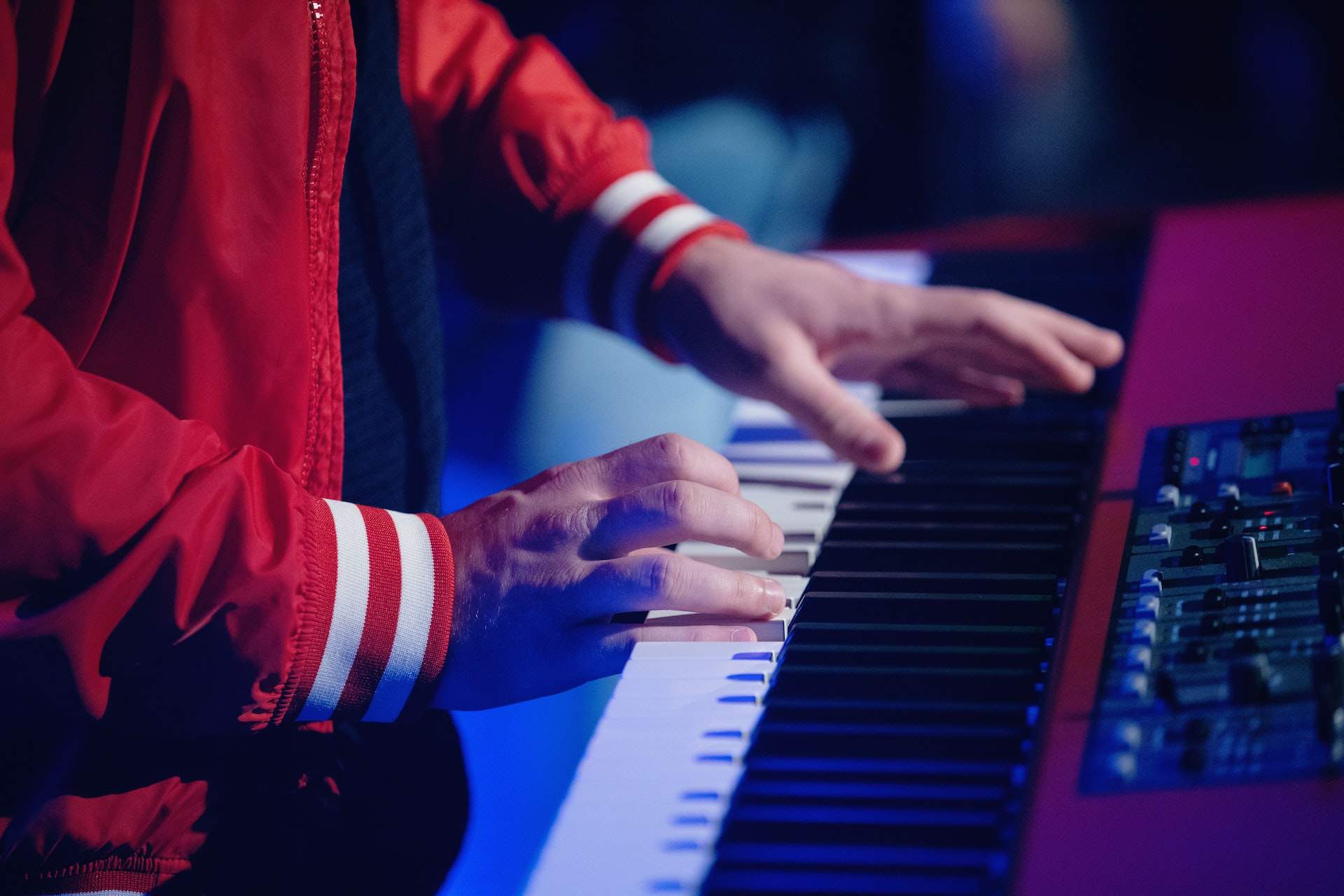
Best Keyboard Piano
Best Piano Keyboards in 2023
- Best Overall – Yamaha P45 88 Key
- Editor’s Choice – Donner DDP-80 88 Key
- Best for Kids – aPerfectLife Kids 37 Key
- Best for Beginners – RockJam 61 Key
- Best for Advanced Players – Alesis Recital Pro 88 Key
- Best for Professionals – Yamaha CP88 88 Key
- Best Under $100 – Hamzer 61 Key
- Best Under $500 – Donner DEP-10 88 Key
- Best Under $1,000 – Casio Privia PX-770 88 Key
- Best With Weighted Keys – Yamaha DGX-670 88 Key
- Best Portable Digital Piano – Finger Dance Folding Keyboard Piano
- Best Stage Piano – Roland RD-88 88 Key
- Best Midi Controller – Alesis V61 Midi
Playing the keyboard piano can either be a hobby, or a full time profession, either way it’s important to get the best digital piano possible to fit your needs. While the highest quality keyboard pianos are expensive, quality digital pianos start at less than $500, whereas a traditional grand piano costs well over a thousand dollars.
Overall, my favorite keyboard piano is the Yamaha P45 due to its price, quality build, and numerous features. However, I know everyone looking for a keyboard piano has different needs, so in the following list of keyboard pianos, I tried to find the best piano keyboard for every skill level, budget, and situation.
While I didn’t play every piano on the list, I played most, and spent over 100 hours watching YouTube videos from professional players and examined reviews across multiple websites to select the best options.
Below is the list for the best keyboard piano of 2023
Yamaha P45 88-Key Weighted Digital Piano
Best Overall
Quick Specs:
- Number of keys: 88
- Item weight: 33 pounds
- Polyphony: 64
- Number of voices: 10
- Weighted keys: yes
Pros:
- Less than $500
- Good for all users
- Realistic feel
Cons:
- Only 64 polyphony
The Yamaha P45 is an amazing option for beginners, advanced users, or anyone looking to downsize from a grand piano to a digital piano.
The keyboard has a full 88-key design, with weighted keys that have heavier touch in the low end and lighter touch in the high end, just like the hammers inside an acoustic piano. The matte finish on the black keys is easier to grip when playing for long periods of time.
When looking at this best keyboard piano, you’ll notice there aren’t that many buttons, which helps to streamline the look and keep it simple for beginners and older users.
This piano utilizes samples from a real grand piano, so the sample that you hear will be very realistic. In total, there are ten unique voices that you can play on this piano keyboard.
Read the full review here: Yamaha P45 Review
Donner DDP-80 Piano Keyboard
Editor's Choice
Quick Specs:
- Number of keys: 88
- Item weight: 54 pounds
- Polyphony: 128
- Number of voices: 1
- Weighted keys: yes
Pros:
- Best looking keyboard on the list
- Good for all users
- Realistic feel
Cons:
- Only one voice
The Donner DDP-80 is a great looking digital piano. It has a nice wood finish that looks elegant in any room, but is still much smaller than a grand piano.
The keyboard has a full 88-key design with Donner’s heavy hammer action keys, designed to stimulate the acoustic piano and accurately capture the strength of your fingers like a real piano.
At first glance, you’ll notice it’s a very basic looking keyboard piano. It is minimalistic on purpose, as it is truly designed to be as simple to use as possible. This makes it a great choice for older users, kids, or those who wish to replace a grand piano.
This best keyboard piano utilizes Donner’s Advanced French DREAM sound, bringing you a realistic auditory experience.
Read the full review here: Donner DDP-80 Review
aPerfectLife Kids Keyboard Piano
Best for Kids
Quick Specs:
- Number of keys: 37
- Item weight: 5 pounds
- Polyphony: N/A
- Number of voices: 12
- Weighted keys: no
Pros:
- Cheap for kids
- Small and easy to move
- One-year warranty
Cons:
- More of a toy than a piano
- Should be for kids under 5
- Only 37 keys
The aPerfectLife kids piano is a great gift for children under the age of five. It’s safe and fun to play for children while also helping to teach them about music.
This best keyboard piano is very small, with only 37 keys, so it should not be used for any child looking to take up piano as an actual hobby. Additionally, it feels very toy-like, so if you are looking for a better digital piano for your kid, keep reading below to see the RockJam model I recommend.
The piano has many buttons for kids to press that play beats, change the sound of the piano, play animal noises, and record the sounds they create.
RockJam 61-Key Keyboard Piano
Best for Beginners
Quick Specs:
- Number of keys: 61
- Item weight: 36 pounds
- Polyphony: n/a
- Number of voices: 200
- Weighted keys: no
Pros:
- Under $120
- Includes a seat and headphones
- Many voices
- Free lessons using the Simply Piano app
Cons:
- Keys are not weighted
The RockJam 61-Key Keyboard is a great choice for beginners as it includes all the accessories you need to start playing right out of the box for under $120. It comes with a seat, headphones, and an app to teach you how to play.
Although the keys are not weighted, they are full size, and this best keyboard piano includes a pitch bend switch to adjust the sound of the notes as you play. The kit also includes stickers to place on the keys to mark notes while you are trying to learn.
This digital piano includes an aux and USB input that allow you to play along to the songs of your choice, or you can choose from the 40 demo songs, or 200 rhythms. If you want to play along with different sounds, decide from up to 200 voices, and use the built-in record and playback feature to add your own twist on any song.
Overall, this is a fantastic keyboard pianos for beginners of any age. With 61 keys, it offers enough variety to play most new pop songs and lessons while remaining portable and well-priced.
Read the full review here: RockJam 61-Key Keyboard Piano Review
Alesis Recital Pro 88-Key Digital Piano
Best for Advanced
Quick Specs:
- Number of keys: 88
- Item weight: 26 pounds
- Polyphony: 128
- Number of voices: 12
- Weighted keys: yes
Pros:
- Hammer weighted keys
- Three-month piano lesson subscription is included
Cons:
- None noted
While the RockJam Keyboard was my favorite for beginners, this is my favorite for advanced, because the Alesis Recital Pro has a full 88-keys that are hammer-weighted. This allows you to practice with the feel of a real piano for about $300.
Alesis is a well-respected musical instrument company and has been in business for over three decades. Their keyboards include a three-month subscription to a teaching app they developed to help you develop your skills even further.
When you take a look at this best keyboard piano, it’s basic looking, but that’s because the bells and whistles are inside. It includes 12 voices, powerful 20W built-in speakers, must-have connectivity options, and an immense 128-note maximum note polyphony.
Overall, it’s a great option for beginners looking to upgrade to a full size 88-option, or advanced players.
Read the full review here: Alesis Recital Pro Review
Yamaha CP88 88-Key Stage Piano
Best for Professionals
Quick Specs:
- Number of keys: 88
- Item weight: 41 pounds
- Polyphony: 128
- Number of voices: 57
- Weighted keys: yes
Pros:
- High-quality built for traveling musicians
- Variety of hookups for recording and playing out loud
Cons:
- Expensive
Touring musicians require a durable, reliable, and keyboard. The Yamaha CP88 is made from a durable frame and has sturdy knobs and controls that can survive rough travel.
The user interface is easy to understand, and controls allow you to switch between different sounds easily. The main sections are divided in a user-friendly way, and the control screen is easy to read.
The keyboard action is similar to what you can expect from a high-end Yamaha stage piano and has a great feel. It uses natural wood graded touch, so the feel and touch are almost identical to an acoustic piano.
The sound on this best keyboard piano is very realistic, although there are no built-in speakers, so you will need your own set-up.
Overall, it’s am upgrade from Yamaha’s very popular CP-40 stage piano, and excels in almost every regard.
Read the full review here: (coming soon)
Hamzer 61-Key Keyboard Piano
Best Under $100
Quick Specs:
- Number of keys: 61
- Item weight: 11 pounds
- Polyphony: n/a
- Number of voices: 61
- Weighted keys: no
Pros:
- Price
- Lightweight and portable
- Light up keys for playing along
Cons:
- Only 61 keys
The Hamzer digital piano has built-in speakers, or a headphone jack if you wish to practice quietly. It includes 255 timbres, 255 rhythms, 61 voices, and 24 demonstration songs.
This best keyboard piano is designed for beginner use, as it has lighted keys that allow you to follow along to demo songs as they play. Included in the box are stickers to label the piano keys to learn notes faster.
With a microphone included, you can record music as you play on the piano, then listen back to it.
Overall, it’s a fantastic keyboard piano under $100, and is easy to use, lightweight, and easy to transport.
Read the full review here: Hamzer Keyboard Review
Donner DEP-10 Digital Piano
Best Under $500
Quick Specs:
- Number of keys: 88
- Item weight: 48 pounds
- Polyphony: 128
- Number of voices: 8
- Weighted keys: yes
Pros:
- Semi-weighted keys
- Includes a stand with three sustain pedals
- Beautiful and sleek design
Cons:
- None noted
This digital piano by Donner has a sleek and beautiful design with its matte black stand to match the piano. Include in the stand are three sustain pedals.
It utilizes semi-weighted keys to provide you with greater control over your music and a more realistic feel for learning or teaching. Built in to the keyboard are two 25W speakers and an MP3 player to bring you a better playing experience.
This best keyboard piano comes with eight professionally crafted voices to let you enjoy a variety of instruments, and 128 polyphony. There’s a metronome with four variations of rhythms.
Overall, it’s a beautiful designed digital piano with textured keys that offer an exceptional playing experience. It’s a great option for players of all skill level.
Read the full review here: (coming soon)
Casio Privia PX-770 Upright Piano
Best Under $1,000
Quick Specs:
- Number of keys: 88
- Item weight: 70 pounds
- Polyphony: 128
- Number of voices: n/a
- Weighted keys: yes
Pros:
- Upright style digital piano
- Connect your phone with a built-in app
- Duet mode
Cons:
- Not great for recording music
The world-renowned Privia family of digital pianos grows with the PX-770, designed to provide a true grand piano experience in a slim, modern design. With authentic piano sound, natural feel and impressive features, the PX-770 is a brilliant instrument for inspiring brilliant performances.
Casio has wowed music critics for years with it’s Privia models, and that family grows larger with the PX-770. It’s designed to provide a grand piano experience with a slim and modern design.
This best keyboard piano uses the same tri-sensor scaled hammer action II keyboard as Casio’s most popular modes and captures the dynamics of a performance with the speed and accuracy to support performers. The built-in amplifier results in a loud and clear performance without speakers.
The PX-770 comes with a built-in library of ten classical songs to play along with, but you can also plug in a phone or computer to play along with other songs, or record your own music.
Overall, it’s modern, and a great keyboard piano for individuals needing a realistic piano under $1,000.
Read the full review here: (coming soon)
Yamaha DGX-670 Piano Keyboard
Best with Weighted Keys
Quick Specs:
- Number of keys: 88
- Item weight: 47 pounds
- Polyphony: 256
- Number of voices: 630
- Weighted keys: yes
Pros:
- Realistic key feel
- 630 voices
- Bluetooth connectivity
Cons:
- Over $500
When searching for the best keyboard piano with weighted keys, the goal was to find the keyboard that most mimicked the feel of a traditional piano. After testing, the Yamaha DGX-670’s graded hammer standard had the most realistic feel.
Yamaha used CFX stereo sampling to accurately capture the sound of grand piano for a perfectly rich sound. The keyboard responds to your touch variation in the same manner as a grand piano.
The DGX-670 offers a wide range of 630 voices in addition to the piano. These include realistic-sounding instruments like the electric pianos, organs, and strings, to catchy synthesized sounds.
The digital keyboard also includes a variety of other features like Bluetooth, microphone input, and an interface for the Yamaha app.
Read the full review here: Yamaha DGX-670 Review
FingerDance Folding Keyboard Piano
Best Portable Digital Piano
Quick Specs:
- Number of keys: 88
- Item weight: 9 pounds
- Polyphony: n/a
- Number of voices: 128
- Weighted keys: no
Pros:
- Extreme portability
- 10-hour battery life
- Supports multiple apps
Cons:
- Sound quality
While I was reviewing portable keyboard pianos, I wanted to find a quality folding piano for this choice. Although you will lose sound quality on a folding keyboard, it’s an option some people need, so I included one in the list. If you do not want to sacrifice sound quality, I recommend a lightweight, non-folding option.
The creative foldable design, which can be folded in half, weighs only nine pounds and measures less than 28 inches after folding. It’s a perfect travel keyboard and comes with a travel bag. Or just fold it up at home after you are done playing to save space.
This best keyboard piano includes built-in Bluetooth connection, allowing you to connect your devices like phones, PCs, or tablets. You can use your favorite teaching applications like Perfect Piano, Pop Piano, or other online music lessons.
If you are looking for variety, choose from 128 rhythms, 128 voices, and 21 demos to play along with.
Read the full review here: (coming soon)
Best Stage Piano
Quick Specs:
- Number of keys: 88
- Item weight: 30 pounds
- Polyphony: 128
- Number of voices: 12
- Weighted keys: yes
Pros:
- Natural keyboard action
- Simple interface
- Only 30 pounds
Cons:
- None noted
The RD-88 piano upgrades the tradition Roland models by providing a more portable and lightweight option for traveling musicians. At only 30 pounds, this stage piano doesn’t lose that classic RD feel, and still offers sturdy controls, and a reliable keyboard action that feels natural.
Roland uses its newly developed SuperNATURAL technology that allows you to drastically change the sound of the best keyboard piano in just a few intuitive knob twists. For extra versatility, there’s a section of acoustic and electronic sounds found in Roland’s flagship synthesizers.
The RD-88 has a clean and compact design perfect for small spaces, a large stage, or cramped rehearsal spaces. It has a built-in speaker that can fill a small room with beautiful sound.
Overall, it’s a great stage piano for the travelling musician thanks to its lightweight design and quality features.
Read the full review here: (coming soon)
Best MIDI Controller
Quick Specs:
- Number of keys: 61
- Item weight: 10 pounds
- Polyphony: n/a
- Number of voices: n/a
- Weighted keys: semi
Pros:
- Intuitive design
- Easily connect to your favorite DAW
- Includes MPC Beats , Ableton Live Lite and Xpand!2
Cons:
- Control knobs are a little sensitive
With its series of pads, knobs, and buttons, the Alesis V61 is an easy-to-use, intuitive MIDI controller that allows you to be in control of your music software. This best keyboard piano has 61 full-size and adaptive piano keys, octave up/down buttons, and allows you to expand the keyboard to play bass lines, chords, and melodies.
V61 includes four assignable knobs and buttons for controlling effect plugins or virtual instruments: open and close filters, adjust volume levels, activate effects, tweak parameters, and more. Eight velocity-sensitive backlit pads allow you to launch clips or finger drum with exceptional response. Use the pitch and modulation wheels to expand the expressive capabilities of your performing.
If you are new to music production, Alesis includes MPC Beats, Ableton Live Lite and Xpand!2. This top-of-the-line recording software suite provides core tools for any artist to create and record their ideas.
Frequently Asked Questions Regarding Best Keyboard Pianos
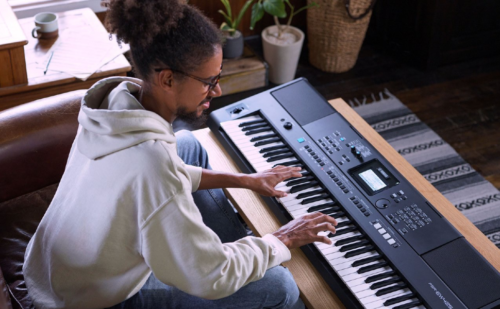
What is a keyboard piano?
A keyboard piano is an electronic musical instrument that simulates the sound and feel of an acoustic piano.
What is the difference between a keyboard piano and a digital piano?
A keyboard piano is typically more lightweight, portable, and less expensive than a digital piano. Digital pianos tend to have more advanced features and a more realistic feel.
What are some important features to consider when choosing the best keyboard piano?
Important features to consider include the number and quality of keys, sound quality, built-in features and effects, connectivity options, and portability when looking for the best keyboard piano.
How many keys should a keyboard piano have?
A full-size keyboard piano typically has 88 keys, but some models have as few as 61 keys. The number of keys you need will depend on your playing style and the types of music you want to play.
What is the difference between weighted and unweighted keys?
Weighted keys simulate the feel of an acoustic piano by providing resistance when you press the keys. Unweighted keys are more lightweight and easier to play.
Can I connect a keyboard piano to a computer?
Yes, many of the best keyboard pianos have USB or MIDI connectivity that allows you to connect them to a computer or other devices.
Can I use headphones with a keyboard piano?
Yes, most of the best keyboard pianos have a headphone jack that allows for private practice.
What is polyphony, and how does it affect the sound of a keyboard piano?
Polyphony refers to the number of notes a keyboard piano can play simultaneously. The higher the polyphony, the more complex and rich the sound can be.
What is a sustain pedal, and do I need one for a keyboard piano?
A sustain pedal is a foot pedal that allows notes to ring out longer. It’s not necessary for playing a keyboard piano, but it can enhance the sound and musicality.
Can a keyboard piano be used for live performances?
Yes, many of the best keyboard pianos are designed for live performance and have built-in speakers and other features that make them suitable for live use.
How much should I expect to spend on a good keyboard piano?
Prices vary widely depending on the features, quality, and brand of the keyboard piano. You can find a decent keyboard piano for as little as a few hundred dollars, but more advanced models can cost several thousand dollars.
Are there keyboard pianos specifically designed for beginners?
Yes, many of the best keyboard pianos have built-in lesson features and other tools that make them ideal for beginners.
Can a keyboard piano be used for recording music?
Yes, many models have built-in recording features or can be connected to a computer or other recording equipment.
What is a split keyboard feature?
A split keyboard feature allows you to split the keyboard into two sections, each with a different instrument sound.
Can a keyboard piano be used as a MIDI controller?
Yes, many models the best keyboard pianos have MIDI connectivity that allows them to be used as a MIDI controller for recording or performing with software instruments.

